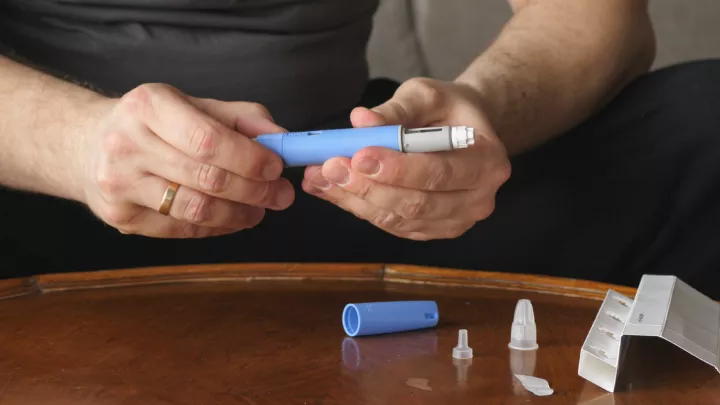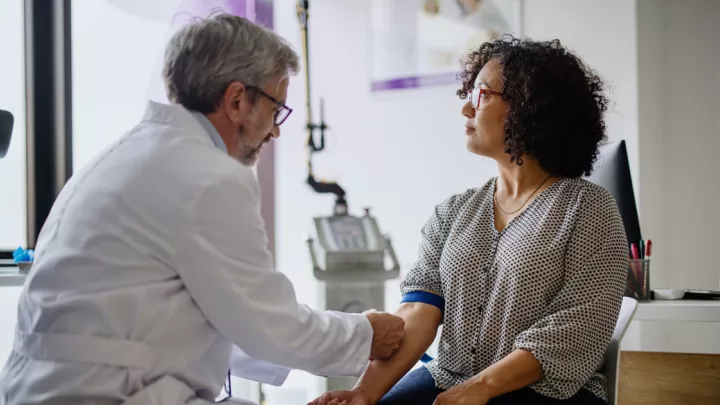5 steps to managing IBD (plus treatment options)

Are you considering talking with a doctor about your gut problems? Are you recently diagnosed and wondering how to manage it?
An estimated 3.1 million adults live with an inflammatory bowel disease, or IBD diagnosis, and up to 70,000 new cases are diagnosed in the United States yearly.
While there is no cure for IBD, managing the disease is essential to control symptoms, reduce flare-ups and improve quality of life.
IBD symptoms can range from mild to severe
IBD is a chronic disease that can negatively impact daily living. Symptoms and when they occur can vary from person to person depending on what part of the intestine is affected and how active the disease is.
It’s essential to monitor your symptoms. If something seems wrong, listen to your body. Talk with your doctor if symptoms do not go away after several weeks. Symptoms can include:
- Rectal bleeding
- Bowel obstruction
- Lack of energy
- Unintended weight loss
- Abdominal pain
- Changes in bowel habits
Learn more about 11 common IBD symptoms and the difference between Crohn’s disease and ulcerative colitis.
5 steps to managing IBD
1. Early detection is crucial. Make sure you get a correct diagnosis.
“An early, aggressive approach to controlling inflammation is key,” says gastroenterologist Peter Mannon, MD, director of Frederick F. Paustian Inflammatory Bowel Disease Center. “The primary risk of not managing a life-long chronic disease is developing complications. Successful medical therapy manages the disease to improve a person’s quality of life and avoid hospitalizations and surgeries.”
A percentage of patients with IBD also have irritable bowel syndrome, or IBS, (a noninflammatory chronic condition), causing some similar symptoms (though not rectal bleeding or bowel obstruction). IBD is not the same, nor is it treated the same as IBS. While they may share specific symptoms, IBD and IBS are two different gastrointestinal disorders.
It’s important to differentiate between them to receive the correct treatment for the appropriate condition and avoid over-treatment of IBS as if it’s IBD.
2. Discuss the appropriate approach to treatment with your doctor.
Find out if you are at higher risk for more active disease or not, which could determine how aggressive initial treatment should be.
3. Discuss treatment options and a management plan that will be specific to you.
Questions to ask:
- What are the signs of a flare-up (more active inflammation) for you?
- How will you determine if the medication is working for you?
- How often will you need tests or imaging studies to monitor progress?
4. Ensure you have adequate access to your doctor and keep your appointments.
Management is vital to successful disease control. Keep your appointments to discuss your symptoms and how management is going, and if any adjustments are needed. During the time that you are working to get IBD under control, it is common to see your doctor every month or two. Once your symptoms are controlled and medications are stabilized, you may see your doctor every six to 12 months.
5. Stay up to date with your vaccinations and other health screenings.
Certain viruses and illnesses can be more severe for people with IBD and those on certain medications.
IBD treatment options
“We have more options for treatment than we’ve had in the past, but despite this, we haven’t seen a change in the development of complications after many years,” says Dr. Mannon. “Diagnosis often occurs in the teens or 20s and is life-long. For patients with Crohn's disease, it’s estimated that approximately 7 out of 10 people will have at least one surgery within the first 20 years. For ulcerative colitis, up to 10% will require a colectomy.”
“There hasn’t been one single IBD medication developed specifically for UC or Crohn’s disease, except for vedolizumab. This drug specifically targets a molecule on white blood cells that blocks these cells from getting from the blood into the gut and contribute to inflammation. Every other medication has been developed for other diseases such as rheumatology or dermatology.”
Newer approaches and clinical trials
More recent treatment approaches include JAK inhibitors that act to inhibit inflammatory signals inside cells. Another newer type of medication works to block white blood cells from exiting lymph nodes to inhibit their participation in gut inflammation.
Additional medications are currently in clinical trials, targeting specific molecules to inhibit inflammation.
Can IBD cause cancer?
Inflammation of the intestine causes continuous cell turnover in the gut lining. This increases the chance of genetic irregularities. People with at least eight years of an IBD diagnosis involving the colon are at an elevated risk of colorectal cancer (excluding patients with ulcerative proctitis only or with Crohn’s disease and less than 1/3 of the colon involved) and small bowel Crohn’s disease can also increase the risk of bowel cancer there.
A cancer risk remains even when IBD is well controlled, but it may be less risky than if it’s not managed. “A cancer risk still remains higher in comparison to the average person,” adds Dr. Mannon. “The risk is high enough that after a certain period, we will recommend an accelerated colorectal cancer screening program.”
Does an anti-inflammatory diet reduce IBD flare-ups?
“When looking at diet plans like the Mediterranean or carbohydrate approach, more often than not, it doesn’t seem to have a significant effect on the inflammatory status,” says Dr. Mannon. “But it can help people to feel better regarding quality of life and may have benefits on other aspects of health. If you want to try a dietary change, especially if considering a vegetarian or vegan diet, talk with your doctor first to discuss the potential risks.”
In general, it is recommended to work toward:
- Low or no sugar
- Low or no processed foods
- High-fiber diet from a variety of sources
Get comprehensive care with IBD management and treatment
The Frederick F. Paustian Inflammatory Bowel Disease Center provides a comprehensive approach to diagnosing, treating and managing IBD. Gastroenterologists work with colorectal surgeons, dietitians, specialty pharmacists, insurance specialists, nurse case managers and physician extenders that provide prompt attention to acute problems.
Research scientists are part of the team, along with ongoing clinical trials and translational research. Innovative feeding studies are currently open for enrollment in partnership with Nebraska Food for Health Center on the Lincoln campus.
Need help with diagnosis, treatment or management of IBD? Call 800.922.0000 for an appointment.







